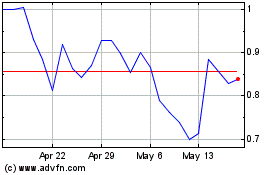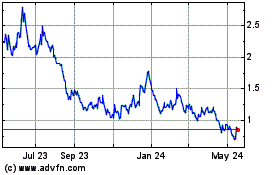FuelCell Energy to Help Power UConn’s Innovation Drive Towards 2030 Carbon Neutrality with Solid Oxide Fuel Cells on Storrs Campus
25 June 2024 - 10:00PM

FuelCell Energy, Inc. (Nasdaq: FCEL) and the University of
Connecticut (UConn) have announced that UConn will use FuelCell
Energy’s solid oxide fuel cell technology for its Innovation
Partnership Building (IPB) at the UConn Tech Park on its Storrs
Campus.
Four of FuelCell Energy’s 250-kilowatt solid oxide fuel cells,
with a combined one megawatt of electricity generation capability,
will provide power and thermal energy to support current and
planned future demand of the IPB—allowing it to operate
independently from the local utility grid. FuelCell Energy and
UConn will work together as part of a power purchase agreement and
will also collaborate on educational opportunities for students
that include educational lectures, facility tours, and internship
opportunities for engineering students.
UConn’s Sustainable Energy LeadershipUConn is
known for both the study and adoption of sustainable energy
technologies while supporting the sustainable energy innovation
happening in its home state of Connecticut, such as at
Connecticut-based FuelCell Energy. This leading public research
university has committed to transforming its Storrs flagship campus
to carbon neutral by 2030, and the FuelCell Energy platforms are
part of these broader sustainable energy efforts.
UConn President Radenka Maric, a recognized global authority on
sustainable energy, commented, “This valuable partnership will help
UConn to accomplish two critical goals: utilizing clean and
sustainable energy sources to power our campuses as we work toward
our carbon neutrality goals while at the same time providing
research and learning opportunities for members of our campus
community.” She added, “Ensuring that UConn is as sustainable as
possible and supporting research and innovation in the clean energy
field is one of the great challenges of our lifetimes.”
UConn will oversee the technical and programmatic work of eight
regional groups called Technical Assistance Partnerships in
different parts of the U.S. with its campus serving as the main
Technical Analysis and Support Center in the Department of Energy
decarbonization project.
FuelCell Energy’s President and CEO Jason Few said, “We are
thrilled that our home state university shares our passion and
purpose to develop and drive sustainable energy solutions and has
been recognized for its leadership in sustainable energy study and
adoption. It is an honor to work with President Maric, her
administration, research teams, and operations to support UConn’s
Innovation Partnership Building and 2030 carbon neutral goal.”
Overview of FuelCell Energy Project at UConnThe
FuelCell Energy project at the IPB will be completed in two phases,
with two of the 250 kilowatt SOFC units being installed during each
phase. Data collected from the fuel cells will be used by students
and faculty for academic analysis. After the completion of phase
two, the system will be integrated into a building microgrid, and
any unused power will be exported to the Eversource grid under the
fuel cell net metering tariffs.
Additionally, each unit will be configured to operate in a
combined heat and power (“CHP”) mode. This will allow UConn to
integrate the thermal energy recovery into the operating thermal
system that already exists within the IPB.
“Innovation requires energy, and our leaders have worked hard to
establish an environment where our power needs are met without
negatively impacting our carbon footprint,” said Pamir Alpay,
UConn’s Vice President for Research, Innovation, and
Entrepreneurship. “These fuel cell units will sufficiently power
the entire Tech Park, UConn’s nexus for research progress. In the
process, we move closer to our goal of carbon neutrality without
compromising the needs of our partners and centers that call the
Tech Park home.”
About Solid Oxide Fuel CellsFuelCell Energy’s
SOFC system generates 250 kilowatts of reliable, efficient, and
low-carbon power per fuel cell and can run on 100% hydrogen,
natural gas and hydrogen blend, biogas, or natural gas. The
system’s superior fuel efficiency to combustion-based power
generation can improve a customer’s return on investment. A clean
emissions profile, small footprint, and quiet operation make the
fuel cell easy to site in urban areas.
About FuelCell EnergyFuelCell Energy, Inc. is a
global leader in sustainable energy technologies that address some
of the world’s most critical challenges around energy, safety, and
global urbanization. It collectively holds 531 fuel cell technology
patents in the United States and globally. As a leading global
manufacturer of proprietary fuel cell technology platforms,
FuelCell Energy is uniquely positioned to serve customers including
businesses, utilities, governments, and municipalities with
sustainable products and solutions. The company’s solutions are
designed to enable a world empowered by sustainable energy,
enhancing the quality of life for people around the globe. Learn
more at fuelcellenergy.com
About University of Connecticut The University
of Connecticut is a national leader among public research
universities, with more than 32,000 students seeking answers to
critical questions in classrooms, labs, and the community. A
culture of innovation drives this pursuit of knowledge throughout
the University’s network of campuses. Connecticut’s commitment to
higher education helps UConn attract students who thrive in the
most competitive environments, as well as globally renowned faculty
members. Our school pride is fueled by a history of success that
has made us a standout in Division I athletics. UConn fosters a
diverse and vibrant culture that meets the needs and seizes the
opportunities of a dynamic global society.
Press Contact
FuelCell Energy Kathleen Blomquist kblomquist@fce.com
Investor Relations Contact
FuelCell Energy Tom Gelston tgelston@fce.com
FuelCell Energy (NASDAQ:FCEL)
Historical Stock Chart
From May 2024 to Jun 2024

FuelCell Energy (NASDAQ:FCEL)
Historical Stock Chart
From Jun 2023 to Jun 2024
